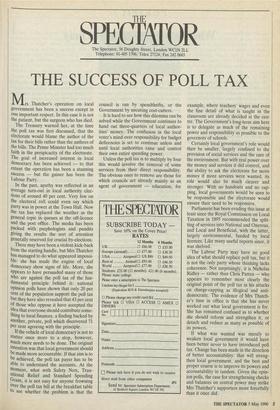SPECTATOR
The Spectator, 56 Doughty Street, London WC1N 2LL Telephone: 01-405 1706; Telex 27124; Fax 242 0603
THE SUCCESS OF POLL TAX
Mrs Thatcher's operation on local government has been a success except in one important respect. In this case it is not the patient, but the surgeon who has died.
The Treasury warned her, at the time the poll tax was first discussed, that the electorate would blame the author of the tax for their bills rather than the authors of the bills. The Prime Minister had too much faith in the perspicacity of the electorate. The goal of increased interest in local democracy has been achieved — to that extent the operation has been a stunning success — but the gainer has been the Labour Party.
In the past, apathy was reflected in an average turn-out in local authority elec- tions of around 40 per cent. Very few on the electoral roll could even say which party was in power at the Town Hall. Now the tax has replaced the weather as the general topic in queues at the off-licence and the post office. The media has been packed with psephologists and pundits giving the results the sort of attention generally reserved for crucial by-elections.
There may have been a violent kick-back from the starting handle, but Mrs Thatcher has managed to do what appeared impossi- ble: she has made the engine of local democracy show signs of life. More, she appears to have persuaded many of those who are against the poll tax of the fun- damental principle behind it: national opinion polls have shown that only 20 per Cent of the population support the poll tax but they have also revealed that 43 per cent of those who oppose it have accepted the idea that everyone should contribute some- thing to local finances, a finding backed by another, private, poll which discovered 71 per cent agreeing with the principle.
If the vehicle of local democracy is not to stutter once more to a stop, however, much more needs to be done. The original intention was that local government should be made more accountable. If that aim is to be achieved, the poll tax payer has to be able to understand the accounts. At the moment, what with Safety Nets, Tran- sitional Relief and Standard Spending Grant, it is not easy for anyone frowning over the poll tax bill at the breakfast table to see whether the problem is that the
council is run by spendthrifts, or the Government by uncaring cost-cutters.
It is hard to see how this dilemma can be solved while the Government continues to hand out three-quarters of local author- ities' money. The confusion in the local voter's mind over responsibility for budget deficencies is set to continue unless and until local authorities raise and control their own entire spending power.
Unless the poll tax is to multiply by four this would involve the removal of some services from their direct responsibility. The obvious ones to remove are those for which councils act already mainly as an agent of government — education, for example, where teachers' wages and even the fine detail of what is taught in the classroom are already decided at the cen- tre. The Government's long-term aim here is to delegate as much of the remaining power and responsibility as possible to the governors of schools.
Certainly local government's role would then be smaller, largely confined to the provision of social services and the care of the environment. But with real power over the money and services it did control, and the ability to ask the electorate for more money if more services were wanted, its role would also be much clearer and stronger. With no handouts and no cap- ping, local governments would be seen to be responsible and the electorate would ensure their need to be responsive.
Parliament has been evading this issue at least since the Royal Commission on Local Taxation in 1895 recommended the split- ting of services into National and Onerous, and Local and Beneficial, with the latter, largely environmental, funded by local licences. Like many useful reports since, it was shelved.
The Labour Party may have no good idea of what should replace poll tax, but it is not the only party whose thinking lacks coherence. Not surprisingly, it is Nicholas Ridley — rather than Chris Patten — who appears to remember most clearly the original point of the poll tax in his attacks on charge-capping as illogical and anti- democratic. The evidence of Mrs Thatch- er's time in office is that she has never worked out what local government is for. She has remained confused as to whether she should reform and strengthen it, or detach and reduce as many as possible of its powers.
If what was wanted was merely to weaken local government it would have been better never to have introduced poll tax. Change has been made in the direction of better accountability: that will streng- then local government, and the best and proper course is to improve its powers and accountability in tandem. Given the opin- ion polls, the case for strengthening checks and balances on central power may strike Mrs Thatcher's supporters more forcefully than it once did.


















































 Previous page
Previous page